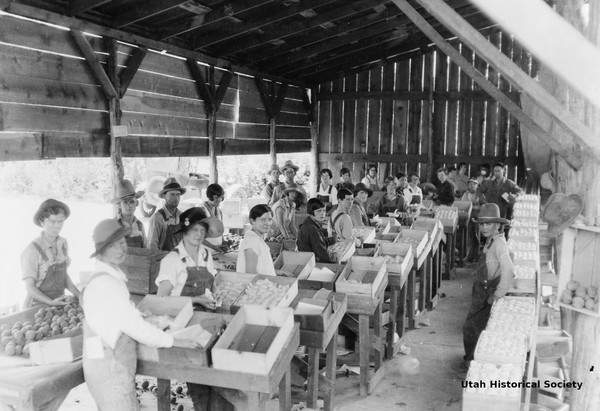Dublin Core
Title
Description
For many in the United States' founding generation, the agricultural way of life was seen to be indispensable to the creation of a stable democracy. Thomas Jefferson said “those who labour in the earth are the chosen people of God.” Farming -- rather than industrial development -- offered the surest way to avoid corruption and sustain the American experiment. While Utah's Mormon settlers shared Jefferson's powerful vision of political independence and economic self-sufficiency built on an agrarian identity, a nation of farmers was harder to implement here in Utah.
First, while Jefferson emphasized private ownership, Mormon settlers who entered the Salt Lake Valley in 1847 set aside private property rights in favor of communitarianism. In early Utah, the Latter-day Saint Church owned common resources, assigned labor, and redistributed products throughout the community. As LDS leader Brigham Young decreed, “There shall be not private ownership of the streams that come out of the canyons, nor the timber that grows on the hills. These belong to the people: all the people.” Settlement patterns in the Utah Territory also diverged from the Jeffersonian model of isolated homesteads. Instead, Mormons worked together to build communal canal systems and structured their settlements as compacted homes surrounding a central church. It was not until 1869, when federal land laws extended to Utah, that true private ownership even became possible.
The second way Utah diverged from the Jeffersonian ideal was in how the state embraced industries beyond agriculture. Extractive industries such as coal and hard-rock mining did not fit Jefferson's idea of small-scale, independent capitalism, nor with the goals of the LDS Church. The noble family farmer was supposedly the antidote for the evils that piled up in cities: vice, civil unrest, and deep class divisions. Yet mining seemingly brought these very things to Utah. Mining was an expensive endeavor dominated by corporations and inextricably tied to external financing and faraway markets, and therefore prone to boom-and-bust economic cycles.
Jefferson’s vision of the yeoman farmer influenced American history, patterns of Western colonization, and even the original intentions of Mormon settlers. But Utah's history is unique because of its very divergence from Jefferson's powerful ideal.
Creator
Source
_______________
See Greg Smoak, Nate Housley, and Megan Weiss, Rural Utah at a Crossroads(Utah Humanities, 2023); Thomas Jefferson, Notes on the State of Virginia (1786), Linda Kerber, Federalists in Dissent: Imagery and Ideology in Jeffersonian America (Ithaca, NY: Cornell University Press, 1970); Jan Lewis, The Pursuit of Happiness: Family and Values in Jefferson’s Virginia (New York: Cambridge University Press, 1985); Peter Onuf, Jefferson’s Empire: The Language of American Nationhood (Charlottesville: University of Virginia Press, 2000).

